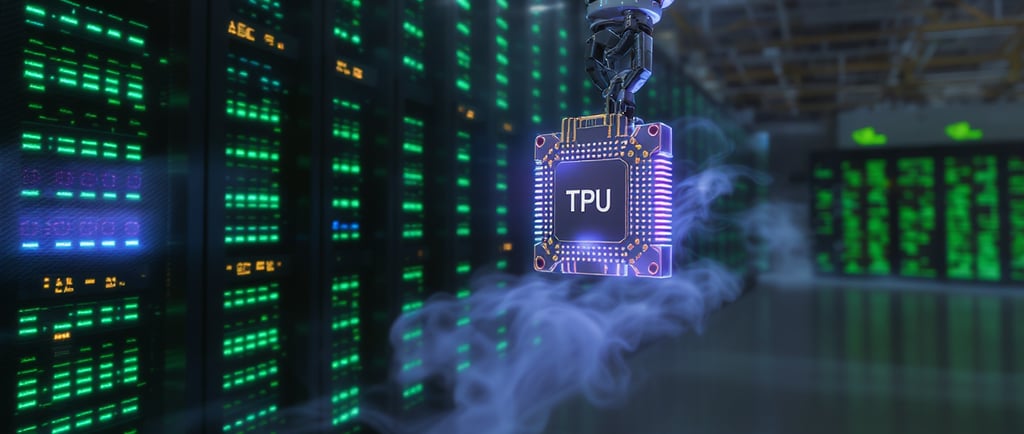Google AI Chips 2025: How Ironwood TPUs Are Disrupting NVIDIA’s Dominance
oogle is no longer an AI chip outsider. With the launch of its Ironwood TPU, the tech giant is directly challenging NVIDIA’s stronghold on AI hardware.
AI, DATA & EMERGINGGOOGLE


Google AI Chips: The End of NVIDIA’s Monopoly?
Introduction
For years, NVIDIA has dominated the artificial intelligence chip market, becoming the go-to provider for training and inference workloads across the globe. But in 2025, Google is making a bold move to change that narrative. With the launch of its Ironwood TPU (Tensor Processing Unit), Google is positioning itself not just as a cloud provider, but as a serious competitor in the AI hardware space. This article explores how Google’s latest AI chip is disrupting the market and why it matters for the future of AI infrastructure.
Google’s Ironwood TPU: A Game Changer
Google’s seventh-generation TPU, codenamed Ironwood, is its most powerful AI accelerator to date. Designed in-house, Ironwood is built to handle both training and inference workloads at scale. Each chip delivers 4.6 petaFLOPS of dense FP8 performance, slightly outperforming NVIDIA’s B200 GPU, which clocks in at 4.5 petaFLOPS.
Ironwood also features 192 GB of HBM3e memory with 7.4 TB/s bandwidth, putting it on par with NVIDIA’s top-tier chips. What sets it apart is Google’s ability to scale these chips into massive pods—up to 9,216 TPUs in a single deployment—eliminating data bottlenecks and enabling unprecedented performance for large-scale AI models.
Why This Matters: Challenging NVIDIA’s Ecosystem
NVIDIA’s dominance has been fueled not just by raw performance but by its CUDA ecosystem, which has become the standard for AI development. However, Google is betting that vertical integration—controlling the entire stack from chip design to cloud deployment—will offer better performance, cost-efficiency, and scalability.
Major AI labs are already taking notice. Anthropic, the company behind the Claude AI models, has committed to using up to one million Ironwood TPUs, signaling a major shift in the industry. This deal alone is worth tens of billions of dollars, and it underscores growing confidence in Google’s AI hardware capabilities.
Market Implications: A New AI Chip Race
Google’s entry into the high-performance AI chip market is more than just a technical milestone—it’s a strategic inflection point. With Amazon developing Trainium and Microsoft working on its own AI accelerators, the market is moving toward custom silicon as a way to reduce dependency on NVIDIA.
This competition is likely to:
Drive down prices for AI hardware
Increase innovation across chip architectures
Give cloud customers more choice in infrastructure providers
Still, NVIDIA isn’t backing down. The company is expected to respond with aggressive pricing, new partnerships, and faster product roadmaps to maintain its lead.
What’s Next for Google?
Google’s long-term vision is clear: build a self-reliant AI infrastructure that can power its own products like Gemini, Veo, and Imagen, while also offering these capabilities to external customers through Google Cloud. With $93 billion in capital expenditures planned for 2025, Google is all-in on this strategy.
The company is also leveraging its AI software stack, including TensorFlow and JAX, to optimize performance on its TPUs—something that third-party chipmakers can’t replicate as easily.
Conclusion
Google is no longer just a consumer of AI chips—it’s now a formidable competitor to NVIDIA. With Ironwood TPUs delivering top-tier performance, massive scalability, and deep integration with Google Cloud, the company is reshaping the AI infrastructure landscape. While NVIDIA remains a dominant force, the rise of custom silicon from hyperscalers like Google signals a new era of competition—one that could ultimately benefit the entire AI ecosystem.
Sources
CNBC – Google unveils Ironwood TPU to compete with NVIDIA
The Register – Ironwood TPU vs NVIDIA Blackwell performance comparison
Forbes – Google TPUs vs NVIDIA GPUs: Market implications
VentureBeat – Google debuts Ironwood with 4x performance boost and Anthropic deal


